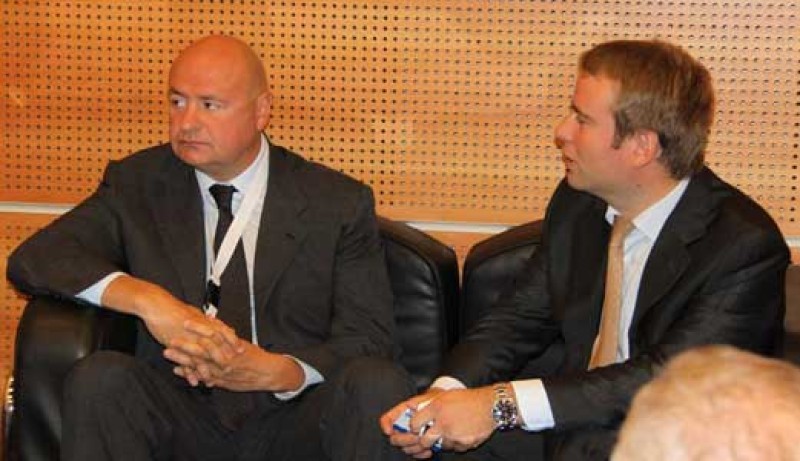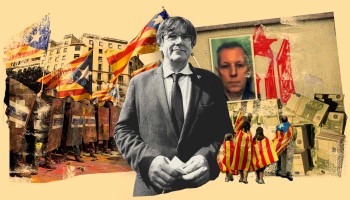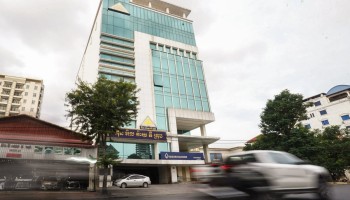Similar fraudulent schemes went undetected because no Magnitsky blew the whistle to expose how the wealthy and the powerful were looting the Russian budget.
Novaya Gazeta and OCCRP talked with a banker and a lawyer who played major roles in these Russian frauds and have pieced together what happened in these other cases. The reporting shows that corporate crime is commonplace in Russia, where systems from banks to courts to the tax administration were easily corrupted for personal profit.
The techniques used in the Magnitsky case were ruthlessly efficient. Law enforcement first seized documents and company stamps from Hermitage Capital, the American-owned investment firm Magnitsky represented, and used them to set up counterfeit Hermitage subsidiaries.
A second set of fake companies set up by the same people then made false claims against these subsidiaries. A Russian arbitration court ruled for the claimants and entered judgments that created giant paper losses offsetting Hermitage’s income.
Since, on paper, the company no longer made a profit, the perpetrators filed a refund request on behalf of Hermitage for US$230 million in taxes that the company had paid the government. The perpetrators then spirited the money out of the country through offshore accounts.
The Magnitsky case was not the first time this technique was employed.
In 2006, one year prior to the raids on Hermitage, a nearly identical scheme was used to steal the equivalent of US$107 million from the Russian budget. This time the fraud centered on a company called Rengaz, which traded Russian blue chip stocks and was managed by one of the largest investment funds in Russia, Renaissance Capital.
The Rengaz fraud, like Magnitsky, set up fake companies to act as claimants with the very same directors who would show up in the Magnitsky case a year later. The same Moscow tax offices (number 25 and 28) approved the fraudulent tax refunds in both cases and the same small Moscow Universal Bank of Savings (UBS) processed many of the transactions. OCCRP has proven that the ex-husband of one of the officials in tax office #28 received some of the stolen money.
The big difference between the two cases was that nobody shouted fraud in the Rengaz instance. No one turned it into an international issue and a thorn in the side of Russia-United States relationships. Unlike Hermitage, Renaissance Capital never alerted the authorities about the stolen money. The only victims of the massive theft were the taxpayers of Russia.
The Lawyer and the Arbitration Courts
Rulings from Russian arbitration courts played a significant role in both cases. Russian law allows companies to file a request for a tax refund if they can prove that they incurred a loss after paying their taxes. The Rengaz fraudsters, hiding behind ghost companies, artificially created losses by suing fake Rengaz subsidiaries (which they also controlled) for unpaid bills.
The court certified the false claims and the thieves, armed with the court's decisions, went to the same Moscow tax offices which almost instantly approved refunds. The very same people would play identical roles in the Magnitsky fraud a year later.
Andrei Pavlov is a Russian lawyer who participated in the arbitration proceedings in both the Rengaz and the Magnitsky cases. Pavlov simultaneously represented, although in different courts, both the interests of Hermitage and Rengaz and the companies that were suing them. Still other lawyers participating in these arbitration proceedings on both sides confessed afterward during questioning that they, too, were acting on behalf of Andrei Pavlov.
In the Magnitsky case, Pavlov later told Russian investigators that he was acting on behalf of Viktor Markelov, a sawmill worker, who later pled guilty to stealing US$230 million in the Magnitsky case. Markelov got a minimum sentence of five years in a correctional facility. Few believe Markelov was anything more than a proxy, something Pavlov confirmed.
“There are certain limits to what I can tell you regarding the information we received from [Markelov],” Pavlov said in a meeting with OCCRP. “Of course, it would be ridiculous to say that Markelov is a fraudster who committed this crime by himself. He was the head and the owner of the company which was our client. But besides him there were other people, that’s true.”
Pavlov said that Markelov asked him to represent the interests of “directors of companies who are nominees and can’t show up in court."
Pavlov said he may have looked the other way regarding what was happening but that was how all lawyers in Russia handled clients in 2006.
“It would have been great, if all clients had been honest and had not lied to their own lawyer at least. But in those times it was impossible to find such clients. That is why … all lawyers preferred to close their eyes and say: ‘Listen, it’s your own problem. If anything (happens), you’ll be responsible.’"
Pavlov said Markelov was fronting for people from the Universal Bank of Savings (UBS), but the lawyer refused to reveal names. “Law enforcement officers asked me what was going on, and I told them, but then I saw that they were not very interested. The criminal case about money laundering, if we are speaking about …[the Magnitsky case], is still ongoing. But we don’t see any results, at least publicly. And I am sincerely interested in results appearing.”
Pavlov admitted to OCCRP that, in both cases, he knew that the claimants and the respondents were essentially the same people. “It’s not good, but there is no violation of the law. It was usual in Russia,” said the lawyer.
“I don’t deny that maybe somewhere I could have done something wrong,” he said. “But I ask you to understand me: the reason was not that I wanted to help somebody to commit a crime, but that the request wasn’t unusual in those times. But I underline this: I didn’t know the exact purpose. It is not in the lawyer’s role to ask odd questions to his client.” The lawyer said the Rengaz case was the same scheme, but that so far law enforcement has found no evidence of a crime.
The Banker and His Nominees
Court records indicate the small Moscow-based UBS was involved in fraud even before the Rengaz and Magnitsky cases. In 2006, UBS’s owner Dmitry Klyuev, another key figure in the Magnitsky case, was found guilty of an attempt to steal shares of an iron ore processing company called Mikhailovsky GOK. Klyuev was sentenced to three years in jail but the sentence was suspended, as is the usual practice in Russia for first-time offenders.
Klyuev had controlled UBS since 2004 and while he says he sold it in 2006, OCCRP could not verify that claim.
According to court records, the UBS bank issued guarantee letters to ghost companies which falsely claimed they owned shares of Mikhailovsky GOK. Investigators and the court found later that those companies never owned any shares of the ore producer and the whole scheme, including the UBS guarantee letters, was aimed at stealing shares from the real owners of the plant.
During the investigation Klyuev admitted, “This bank actually belonged to me and was bought in October 2004 by re-registering its shares to firms under my control, but with nominal directors and shareholders who were friends of Sergey Orlov, my old friend. The board of directors was also a nominal body and consisted of the same friends of Sergey Orlov.”
Klyuev’s friend Orlov has a criminal background. According to court testimony, Klyuev, Orlov and the sawmill worker Markelov were all involved in the kidnapping and extortion (Orlov_Criminal_Case.pdf) of businessman Fedor Mikheev. The trio teamed with some of the same police officers who were involved in the Magnitsky raids, the ones in which company stamps and documents were seized from Hermitage.
Some of these same “friends of Sergey Orlov” who were shareholders or directors at UBS later took part in the arbitration court proceedings in both the Rengaz and Magnitsky cases. They were representing either the subsidiaries getting sued or the claimants.
One example is Gennady Plaksin. In the mid-1990s, Plaskin was selling stockings near a subway station in Moscow but by 2004 he was chairman of the board of the UBS bank.
Plaksin, who was likely a proxy for Klyuev, appeared as the director of two plaintiff companies, Instar and Optim-Service, which sued subsidiaries of Hermitage and Rengaz in both fraud cases.
Klyuev and others whose names appear in the bogus arbitration cases have numerous connections including:
Alexey Sheshenya was the shareholder of two plaintiff companies (Grand-Aktiv and Poleta through an intermediary. He was also a shareholder of a company named YugStroySpetsmontazh. According to the Russian state commercial register, Dmitry Klyuev registered YugStroySpetsmontazh.
Gazim Akhmetshin, the director of one of the fake subsidiaries in the Rengaz scam was also director of another Moscow company which belongs to Klyuev’s wife, Ekaterina Sokolova.
Klyuev met with OCCRP but denied knowing the people in question.
“I don’t know Akhmetshin and have never had any common business with him,” he said. “I heard the names of Plaksin and Sheshenyda from criminal cases and media reports, but have never seen them and never cooperated with them.”
Klyuev also says that he sold his bank to his old friend Semen Korobeynikov before the tax refunds. “UBS didn’t belong to me by that time. I sold it,” says Klyuev. “But people leading [a smear] campaign against me don’t care about that.”
Korobeynikov died in 2008 when he fell from a building that was under construction. He was there to inspect one of the apartments he was buying.
The Beneficiaries
The people behind the looting of the Russian budget put together complex schemes in order to cover up the money trail and who finally benefited. In the Magnitsky case, more than 10,000 transactions were made to conceal the money’s final destination. However, OCCRP has managed to track where some of the money went.
But Klyuev, the banker, and his friend Pavlov, the lawyer, are connected to other similar schemes that were never officially investigated.
In 2011, Novaya Gazeta reported, tax office # 28 in Moscow, the same one that awarded the money to criminals in the Magnitsky case, approved in December 2007 two tax refunds with a combined value of US$ 65 million for two companies named TechProm and Torgoviy dom Arkadia which had accounts at UBS.
The director of TechProm was the wife Gulsina Akhmetshina, of Gazim Akhmetshin who was himself involved in the fraudulent Rengaz tax return. The money took a convoluted route through other ghost companies but four months later in March 2008 the funds entered the bank account of a Moscow company called NaftaImpex where Klyuev’s wife was a shareholder. Soon after, 85 percent of NaftaImpex was acquired by a company from Cyprus called Fungamico Ltd. which, according to the Cyprus register, was headed by Pavlov and belonged to Klyuev.
I don’t know anything about these transactions,” the lawyer Pavlov says. “I was the director of Fungamico, but not the beneficiary. The company was established by Dmitry Klyuev for investments. For some time it owned some assets in Russia, but business went bad, and soon the company was liquidated.”
Reporters for OCCRP showed Klyuev the suspicious transactions, but he denied they were related to the tax refund. “I looked at [OCCRP’s] scheme, and a lot of things raise doubts,” Klyuev says. “First of all – the gap in four months between the payments. If I had been a real beneficiary, the money … would have arrived to me much earlier.”
Klyuev also said since there was no criminal case opened concerning the Rengaz tax refund, no crime had been committed.
“And the most important: UBS didn’t belong to me by that time,” he said referring to his earlier claim that he had sold the bank in 2006.
“Theoretically,” Klyuev continues, “such payment on NaftaImpex could have happened. But you have to understand: after I sold the bank, many companies and clients associated with me remained there. The payment could have been from a client for some earlier services or projects. I don’t exclude that it could have been a payment from the new owners of bank. They simply took a firm which had an account in UBS. There is nothing unusual in such transactions: you don’t need to create new company for every new project. Payments may be proceeded through various means, every banker would tell you that.”
Between March and July 2008 one of the Russian companies involved in this complicated money maze, Camelot LLC, made dozens of wire paymentsto a British Virgin Islands firm named Altem Invest Ltd, which held an account in Cyprus FBME Bank. Camelot was also the recipient of money from the Magnitsky fraud.
A report by Andreas Gross, a member of the Parliamentary Assembly of the Council of Europe (PACE), states that Dmitry Klyuev was the beneficiary of the Altem account.
Banking documents seen by OCCRP also indicate Klyuev was the beneficiary of the account of Altem Invest in 2011 but OCCRP could not verify that Klyuev was the beneficiary of this bank account in 2008.
Klyuev denies any connection to Altem Invest. “I have no relation to this company,” he said. “I have never been its beneficiary or director. I have never heard the name of this Cyprus bank and have never had any accounts there.”
Klyuev said his enemies are fomenting these “speculations.”
“I constantly face such speculations and, frankly speaking, I have got used to them already. Not so long ago there were media reports that Klyuev’s company Fungamico was found and that the [Magnitsky money] is hidden there. That company really belonged to me, but after numerous investigations nothing was found there. And nobody wrote about that.”






